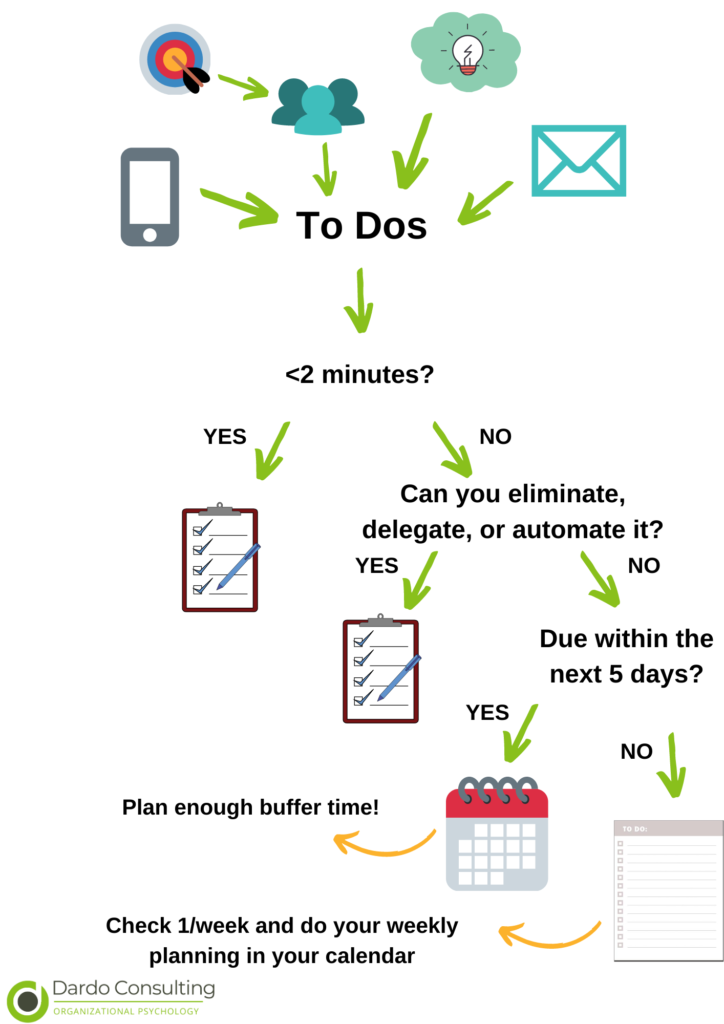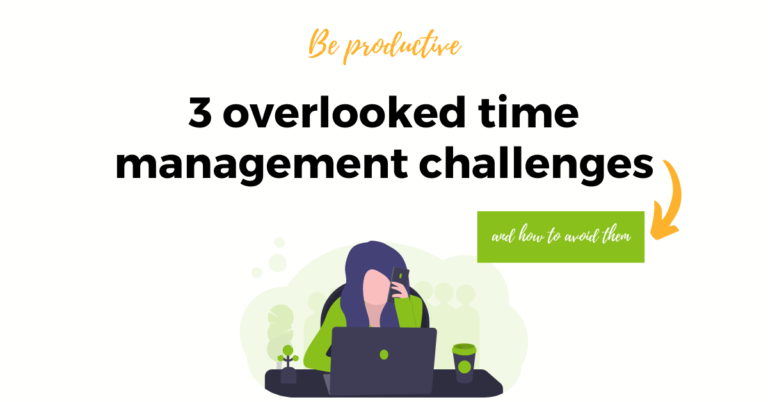Do you want to be productive? Do you want to get stuff done? Do you want to spend your time on the things that really matter?
Most of us do but it is challenging to actually make that happen. As an IO-psychologist helping companies to create better working conditions and working with employees who want to be their best at work, time management often is a topic people ask me for help with.
There are so many tools and tips out there but I often find it’s the lesser obvious challenges that make it difficult for people to be productive.
Here a the top time management challenges I see with my clients and ideas on how to avoid them:
Time management challenge 1: Trying the impossible of getting everything done at the same time
There are always things to do. Have you ever experienced checking off everything on your to-do-list?
The problem is not that we don’t have enough time. The problem is that we don’t know how to spend the time we have in a way that makes us happy and successful.
How are you going to decide and prioritize if you don’t know what success means to you? There are so many roles, opinions, and expectations. And it’s impossible to please everybody. It’s impossible to be there for you kids 24/7, win the Nobel-prize for your extraordinary work, be the perfect partner, have time for your friends 5 times a week, have the lawn cut perfectly, take care of your parents, have time for yourself and your hobbies, cook healthy, clean the house every day, meditate every morning, bake your own bread and so on. If you have an honest look at what you expect yourself to do. Is it really doable? Would you expect it from another person? Or are you expecting the impossible? Are you trying to do it all at the same time and perfectly?
How to stop trying to do it everything: Define how success looks like for you!
Forget about your to-do-list and take some time first to define what success looks like for you. How many people chase a definition of success just to find out at 50, 70, or 90 years old that it wasn’t their own? A perceived expectation from a partner, a parent, a child, a friend, or society?
I remember a coaching session with an incredible woman. She was really good at her job and always pushing to be better. But she wasn’t happy. We did a little exercise to develop a vision that I call “Who and how do you want to be?”. At the end of it, she realized that she just didn’t care that much about being successful at work. She wanted to start a family, travel, have time for the people she loved, have great relationships at work, and be good at what she did but not extraordinarily great. Being extraordinarily great at her job was a perceived expectation from other people but it wasn’t her way to happiness.
Once she realized that she could stop putting all her energy into her job and start focusing on the relationships in her life.
How to find your personal definition of success?
Try the following exercise:
 Imagine it’s your 60th or your 80th birthday. You have a party and different people give a speech. They talk about you, what they love about you, what they have experienced you over the last years.
Imagine it’s your 60th or your 80th birthday. You have a party and different people give a speech. They talk about you, what they love about you, what they have experienced you over the last years.
What would you wish they would say? Not, what do you think they would say but what do you wish they would say? If you could be the person you want to be, what would your family, your friends, and your colleagues say about you?
You don’t have to come up with a perfect answer the first time you do this exercise but every time you think about it and something comes to your mind, write it down.
How does this help with time management? Imagine if you are the person you want to be, you would take time for your friends. Now a friend calls you but you had planned to clean the windows and you have to decide what is more important.
Time management challenge 2: Not taking enough breaks
The more time you spend on something the more you get done, right? Well yes and no. Of course, you need to spend time on something to achieve anything. But a common mistake I see many people do (and let’s be honest, it also still happens to me sometimes) is not take enough breaks.
If you want to be productive, you need to take care of your energy levels. I know it sounds just like common sense, but how often do you really do it? How often do you go on working even if you are tired? How often do you spend hours looking at your computer screen without taking a break?
If I really need to be productive and don’t have a lot of time I use the Pomodoro-technique. You don’t need to use the same technique but what I would advise you to do is to make sure you have at least 1 large break (more than 30 minutes), 2 short breaks (about 15 minutes) and 4-5 mini-breaks (1-5 minutes) in a “normal” 8 hour-workday.
How does the Pomodoro Technique work?

If you use the Pomodoro Technique you divide your workday or part of your workday into 25 minutes chunks to work on your tasks and take 5 minutes breaks between. After 4 Pomodoros (25-minutes chunks) you take a longer break (15 minutes).
The easiest way to use that technique is with a Pomodoro-Timer. There are a lot out there but to get you started and maybe save you some time researching, here are a few recommendations:
- https://www.focustodo.cn/
If you want to use an app, Focus To Do can be a good solution. - https://www.marinaratimer.com/
Great solution if you don’t want to download or install anything. Marina Timer is an online timer. - https://chrome.google.com/webstore/detail/marinara-pomodoro%C2%AE-assist/
My personal favorite if you use Chrome. This timer is a Chrome-Extension and very easy to use which works from any Chrome page without having to open any program or another window. If you want to use your timer also to plan or track your tasks, I would recommend you to try out Focus To Do.
Time Management Challenge 3: Not having the right system that fits your personal situation
There are so many tips and tools and programs out there and it can be difficult to find the right fit.
When I work with employees on that topic usually there are 3 types of people:
- the ones without any kind of system. They are often the ones that are most stressed out. They forget deadlines, don’t know where to start and feel overwhelmed by their tasks and projects.
- the ones with a working system that just need to tweak a few details. They are already quite happy with what they have and they just need a few details fixed to have a great system that actually helps them.
- the ones with the overly complicated system: Not everybody needs a project management tool and sometimes a tool can take more time than the task itself. Often people in this group are struggling with prioritization because they haven’t defined their definition of success. No tool is going to fix that no matter how many functions it has.
How to develop the right system
In my Dardo Time Management Adventure (click here to know more) I teach my students how to develop a time management system step by step.
Here is an overview of which steps to take:
- Define your requirements: What do you use already? What works for you? What doesn’t work for you? Do you want an app or software or pen and paper? Do you work with others as a team or do you work independently? Do you have rather complex projects to manage? Write down what a system should do for you and how it would be really helpful.
- Research different tools and options and find the ones that fit your requirements best.
- Develop a workflow. What are you going to do when a new to-do is assigned to you?
- Plan your week and your day in advance.
Example of a workflow
An example of a workflow can be the following: Whenever a new to-do comes in you ask yourself first: Does it take less than 2 minutes to do it? If the answer is YES, you do it immediately. If it’s not possible to get it done in under 2 minutes the next question could be: Is it somehow possible to eliminate, delegate, or automate it? If yes, do that. If no, the next question could be: It is due within the next 5 days? If it is, the best way is to plan to block a time slot in your calendar for it. That way you have it already planned with date and duration. If the to-do is not due within the next week, you could write it down in your to-do-list or project management tool to not forget about it.



Responses